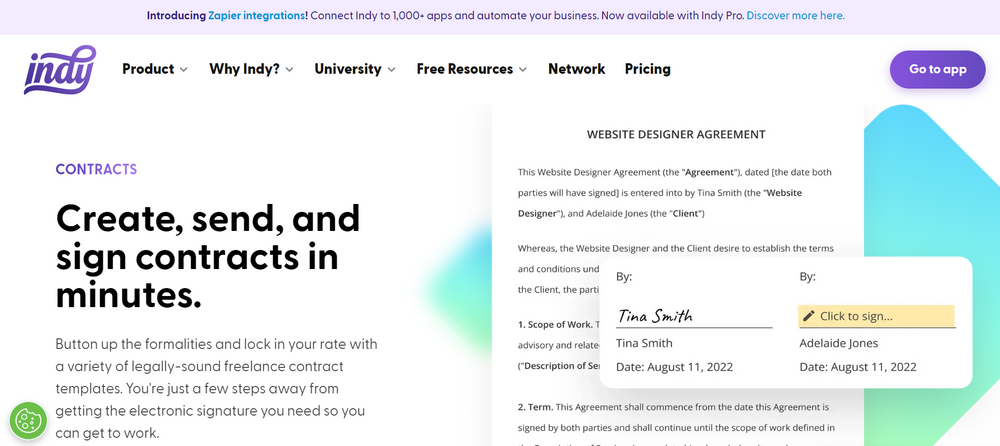Sometimes, even when one or more of a contract's clauses are deemed illegal, the terms might remain effective. This is possible thanks to a specific provision of this agreement called severability.
In this article, we will go through everything you need to know about severability clauses and why they can be important in freelance contracts. We will also cover a few scenarios where such a determination can come in handy. So, let's get started, shall we?
The definition of severability
A severability clause is relatively standard in contracts, but what is it exactly? And why should it matter to freelancers? The name comes from the Latin word “salvatorius” and hints at the ability of some elements to be "severed" from others. This is also sometimes referred to as the "blue pencil rule."
What this clause states is, basically, that if some of the terms of a contract are held invalid (illegal or unenforceable – we'll go through these terms soon), the remainder of the agreement shall still apply.
If some provisions contained in a contract are considered essential, the severability clause will state them as such. In which case, the agreement as a whole would be deemed unenforceable. However, a more common scenario is for the remaining provisions to remain valid. So, instead of having an entire contract seen as illegal, the parties involved agree to keep it in full effect but remove the "offensive" provision. That is, as long as the contract can still express the basic bargain (or initial agreement) effectively!
Severability and the governing law
It's common to find severability clauses in constitutional law, stating that even if some provisions of the law (or their applications) are found unconstitutional, the remaining ones will continue in force. For example, some sections can be considered illegal or invalid for specific people or circumstances without making the entire provision or application unconstitutional.
In countries that have constitutional law, courts typically employ a severability doctrine to determine which clauses of a passed statute need to be evaluated. For example, if one lacks a severability clause, they will help determine if the rest of the clauses can be severed from the statute without affecting its execution.
In the words of Supreme Court judge Brett Kavanaugh: "Constitutional litigation is not a game of gotcha against Congress, where litigants can ride a discrete constitutional flaw in a statute to take down the whole, otherwise constitutional statute." In short, when it comes to applicable law, just because one clause might be deemed an unenforceable provision, it doesn't mean the entire agreement needs to be made invalid.

Why do you need a severability clause?
The main reason why you should always consider working with a severability clause as part of your contracts is that they can prevent an agreement from becoming unenforceable due to the default of just one of its parts. So, for example, if a court strikes down one of your contract's elements, the rest can remain valid.
Generally speaking, most standard freelance contracts will not require this type of clause. However, if something does happen and you end up in court with your client, it's always best to be covered. In fact, many companies will ask for this clause in their contracts for their own protection. Including one in advance can help you appear more credible when dealing with legal teams and larger businesses.
Severability in legal agreements
Severability clauses aim to keep contracts intact even if, as we mentioned before, some sections are considered illegal or unenforceable. But let's look at some examples of severability clauses and how they can affect you as a freelancer.
- In a finance agreement, a severability clause can handle excessive interest rates.
- If a partner commits fraud, the clause can still allow a business to operate normally.
- In an employment agreement, such provision can allow a person to work even if the pay rates were written down incorrectly.
- If a customer makes a mistake in their insurance claim, the claim can continue.
- If an associated business did not comply with HIPAA regulations, the original could still conduct operations.
In short, the purpose of severability clauses is to preserve the valid parts of a contract making sure other parties are not damaged.
Here's an example of a severability clause for an employment agreement (this time, courtesy of Contracts Counsel):
"Severability. Whenever possible, each provision of this Agreement shall be interpreted in such manner as to be effective and valid under applicable law, but if any provision of this Agreement is held to be prohibited by or invalid under applicable law, such provision shall be ineffective only to the extent of such prohibition or invalidity, without invalidating the remainder of this Agreement." Security Exchange Commission - Edgar Database
The parts of a severability clause
A severability clause typically contains two parts: Savings language and reformation language. Let's go through these in a little more detail:
- Savings language: This part preserves the rest of the agreement should a court of competent jurisdiction find part of the contract unenforceable (this part is why the severability clause is also known as a savings clause).
- Reformation language: This part describes how the involved parties want to modify the unenforceable provisions to be made enforceable or if they would rather just delete them.
In most cases, if a court finds an agreement to have invalid clauses, terms, or sentences, the area that is considered problematic will typically be rewritten. The ultimate goal is to make it fit the original intent of the contract as well as the court's new requirements (this is done under the rule of reasonableness).
In some cases, the clause or sentence that is causing an issue is deemed essential for the purpose of the agreement. Then, the entire contract can be made unenforceable.

Examples of severability clauses
Here's an example of what a severability clause looks like in a standard contract.
If a provision of this Agreement is or becomes illegal, invalid, or unenforceable in any jurisdiction, that shall not affect:
- the validity or enforceability in that jurisdiction of any other provision of this Agreement; or
- the validity or enforceability in other jurisdictions of that or any other provision of this Agreement.
And below are other examples of clauses (as found on UpCounsel):
Sample 1: "In the event that a court of competent jurisdiction finds any term or clause in this Agreement to be invalid, unenforceable, or illegal, the same will not have an impact on other terms or clauses in the Agreement or the entire Agreement. However, such a term or clause may be revised to the extent required according to the opinion of the court to render the Agreement enforceable or valid, and the rights and responsibilities of the parties shall be interpreted and enforced accordingly so as to preserve their agreement and intent to the fullest possible extent."
Sample 2: "Unenforceability or invalidity of one or more clauses in this Agreement shall not have an effect on any other clause in this Agreement. If it is possible, any unenforceable or invalid clause in this Agreement shall be modified to show the original intention of the parties."
Sample 3: "If any clause, or portion of a clause, in this Agreement is considered invalid under the rule of law, it shall be regarded as stricken while the remainder of this Agreement shall continue to be in full effect."
How do you write a severability clause?
You can write your own clause from scratch; however, there are boilerplate provisions that can ensure you make no mistakes when it comes to defining this vital part of a contract. For instance, Indy provides a collection of free contract templates that are legally sound and can be customized to fit your needs.
With Indy, you can create, send, and electronically sign contracts and other documents in just minutes. All you need to do is:
- Create a free Indy account.
- Go to the Contracts tool and choose a contract from a variety of legally-sound freelance agreement templates. You can filter these by profession to find the one that is perfect for your case.
- Add your and your client's information.
- Send the contract to your client, so they can sign it (they don't even need to have an Indy account!)
- Monitor all your documents' status and see who's already signed what.
That's it!
Indy's contract templates are legally vetted and available for any profession. For example, there are contracts for consultants, contractors, writers, marketers, photographers, videographers, developers, designers, influencers, and more.
The contract creator will take care of everything (including, of course, the severability clause) so you can review and send your agreement in seconds.

Indy's severability clause
As we mentioned, all of Indy's contracts are legally sound and ready to use. They include all the clauses that will keep both you and your client protected and allow you to make any relevant changes that apply to your project (for example, you can customize your milestones, deliverables, dates, and anything you find in the boilerplate).

Let's take a look at a severability clause as included in an Indy contract. In this case, one for an actor. The clause reads:
"h. Severability. Any term or provision of this Agreement that is invalid or unenforceable in any situation in any jurisdiction shall not affect the validity or enforceability of the remaining terms and provisions hereof or the validity or enforceability of the offending term or provision in any other situation or in any other jurisdiction. If the final judgment of a court of competent jurisdiction declares that any term or provision hereof is invalid or unenforceable, the Artist and the Client agree that the court making the determination of invalidity or unenforceability shall have the power to limit the term or provision, to delete specific words or phrases, or to replace any invalid or unenforceable term or provision with a term or provision that is valid and enforceable and that comes closest to expressing the intention of the invalid or unenforceable term or provision, and this Agreement shall be enforceable as so modified."
As you can see, this example is quite detailed. It covers a variety of situations you might encounter while dealing with clients, such as the possibility of a court declaring a provision invalid or unenforceable. It also gives the court the ability to delete or replace provisions.
This is just one clause covered by Indy's contracts. There are many other clauses that cover the scope of work, terms, payments, termination, proprietary information, limitation of liability, force majeure, arbitration, indemnification, independent contractor status, and more.
Conclusion
First, we saw that a severability clause is a provision within an agreement. Its purpose is to, if some clauses are found illegal or unenforceable, make the rest of the contract still valid. We also saw that severability clauses have two parts: Saving language that preserves the remainder of an agreement, and reformation language that allows certain parts to be modified, as long as all parties involved agree.
It's always a good idea to include such a clause to give your client more peace of mind. If you don't want to write the clause yourself, you can use a boilerplate contract. With Indy, you can use a template, fill in your information, and send it in just minutes – all for free!



